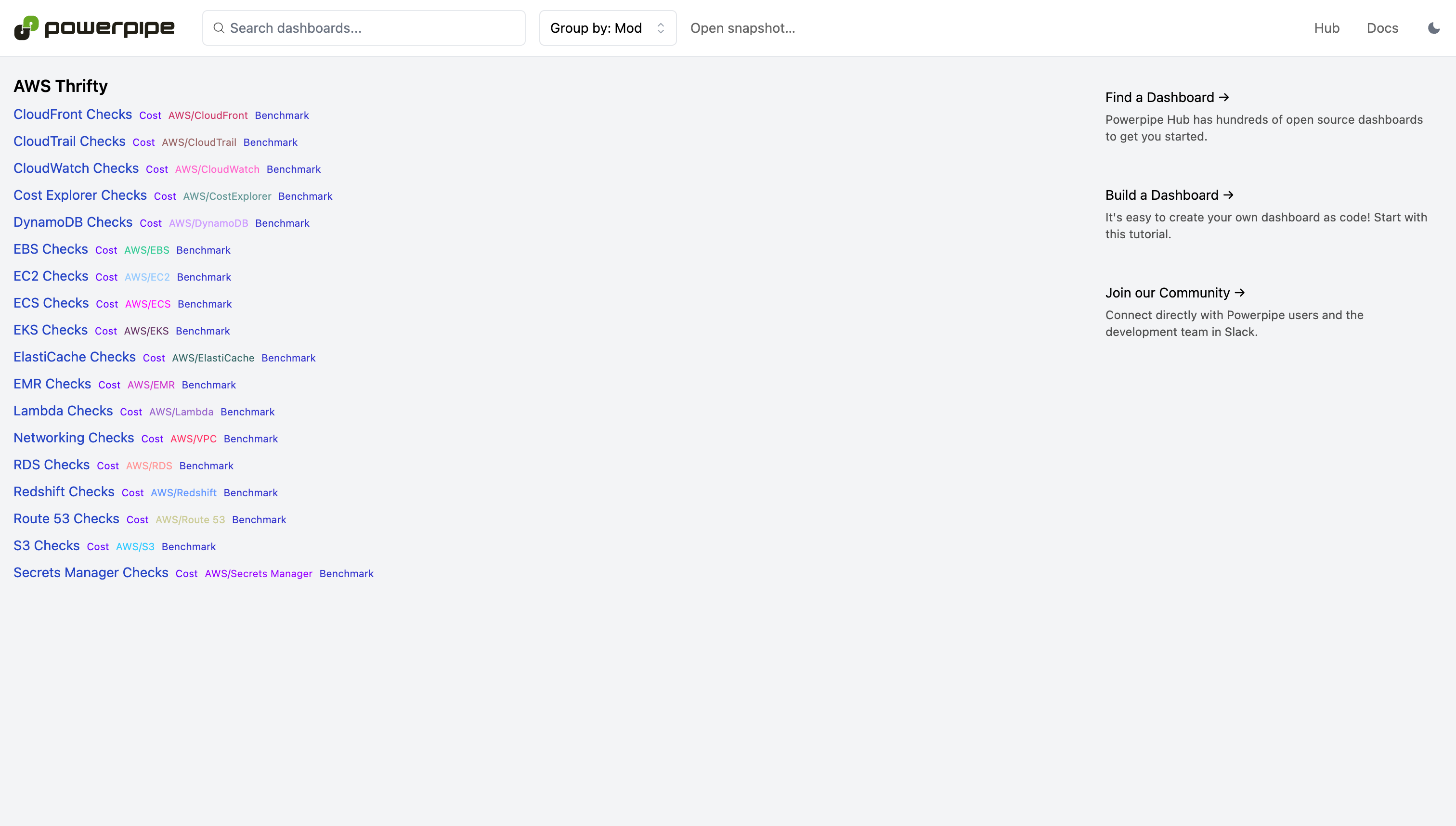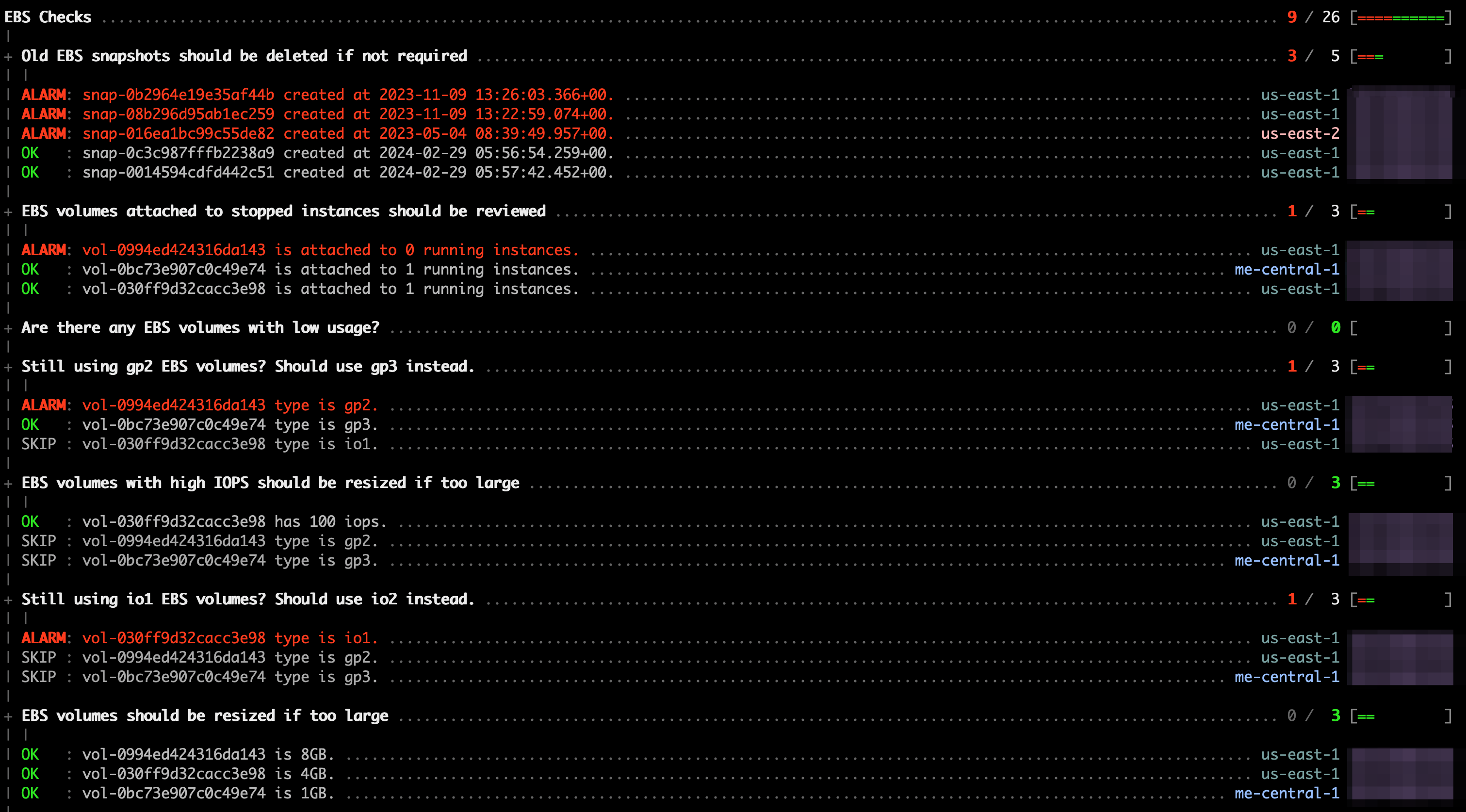An AWS cost savings and waste checking tool.
Run checks in a dashboard:
Or in a terminal:
Includes checks for:
- Month to month swings in service cost from AWS Cost Explorer
- Underused and oversized RDS Databases
- Unused, underused and oversized EC2 Instances
- Unused, underused and oversized EBS Volumes and Snapshots
- CloudWatch Log Groups without retention policies
- CloudWatch Log Streams with stale data
- CloudFront Distribution pricing classes
- Unused EMR Clusters with previous generation instances
- Unused ECS Clusters
- Stale DynamoDB Tables
- Unused and underused Redshift Clusters
- S3 Buckets without lifecycle policies
- Unattached Elastic IPs
- #TODO List
Download and install Steampipe (https://steampipe.io/downloads). Or use Brew:
brew tap turbot/tap
brew install steampipeInstall the AWS plugin with Steampipe:
steampipe plugin install awsClone:
git clone https://github.com/turbot/steampipe-mod-aws-thrifty.git
cd steampipe-mod-aws-thriftyStart your dashboard server to get started:
steampipe dashboardBy default, the dashboard interface will then be launched in a new browser window at http://localhost:9194. From here, you can run benchmarks by selecting one or searching for a specific one.
Instead of running benchmarks in a dashboard, you can also run them within your
terminal with the steampipe check command:
Run all benchmarks:
steampipe check allRun a single benchmark:
steampipe check benchmark.ec2Run a specific control:
steampipe check control.instances_with_low_utilizationDifferent output formats are also available, for more information please see Output Formats.
This mod uses the credentials configured in the Steampipe AWS plugin.
Several benchmarks have input variables that can be configured to better match your environment and requirements. Each variable has a default defined in its source file, e.g., controls/rds.sp, but these can be overwritten in several ways:
-
Copy and rename the
steampipe.spvars.examplefile tosteampipe.spvars, and then modify the variable values inside that file -
Pass in a value on the command line:
steampipe check benchmark.ec2 --var=ec2_running_instance_age_max_days=90
-
Set an environment variable:
SP_VAR_ec2_running_instance_age_max_days=90 steampipe check control.long_running_ec2_instances
- Note: When using environment variables, if the variable is defined in
steampipe.spvarsor passed in through the command line, either of those will take precedence over the environment variable value. For more information on variable definition precedence, please see the link below.
- Note: When using environment variables, if the variable is defined in
These are only some of the ways you can set variables. For a full list, please see Passing Input Variables.
The benchmark queries use common properties (like account_id, connection_name and region) and tags that are defined in the form of a default list of strings in the mod.sp file. These properties can be overwritten in several ways:
-
Copy and rename the
steampipe.spvars.examplefile tosteampipe.spvars, and then modify the variable values inside that file -
Pass in a value on the command line:
steampipe check benchmark.lambda --var 'common_dimensions=["account_id", "connection_name", "region"]'steampipe check benchmark.lambda --var 'tag_dimensions=["Environment", "Owner"]' -
Set an environment variable:
SP_VAR_common_dimensions='["account_id", "connection_name", "region"]' steampipe check control.large_ebs_volumesSP_VAR_tag_dimensions='["Environment", "Owner"]' steampipe check control.large_ebs_volumes
If you have an idea for additional controls or just want to help maintain and extend this mod (or others) we would love you to join the community and start contributing.
- Join #steampipe on Slack → and hang out with other Mod developers.
Please see the contribution guidelines and our code of conduct. All contributions are subject to the Apache 2.0 open source license.
Want to help but not sure where to start? Pick up one of the help wanted issues:

